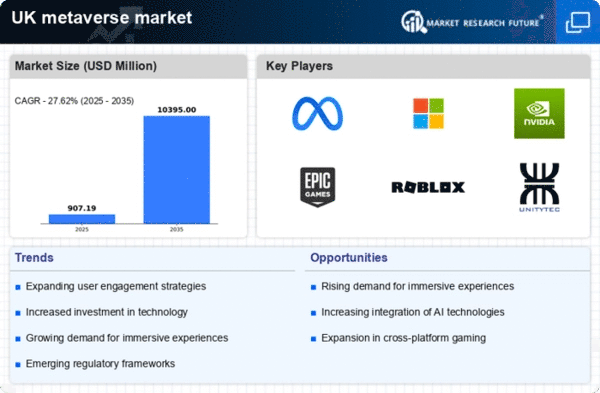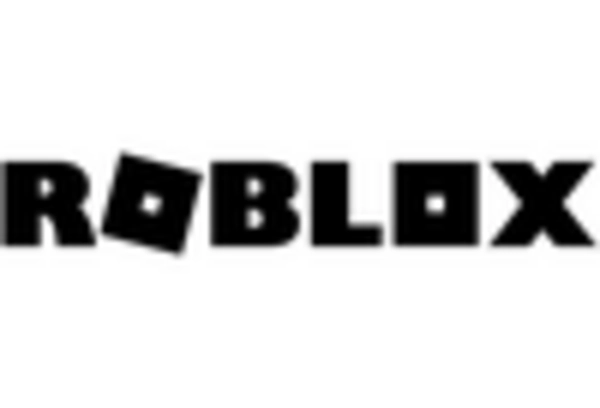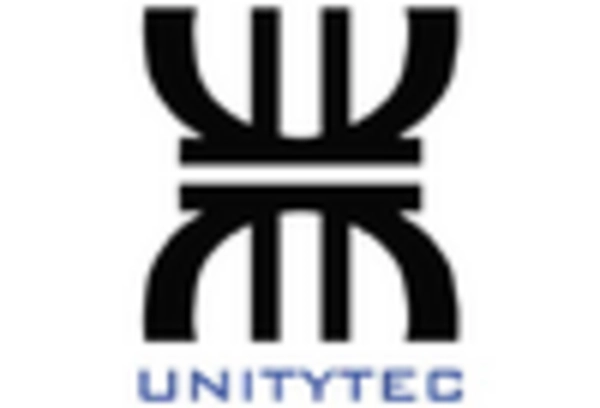Advancements in Virtual Reality
The metaverse in-gaming market is experiencing a surge in advancements in virtual reality (VR) technologies. Enhanced VR headsets and immersive environments are becoming increasingly accessible to consumers in the UK. This technological evolution is likely to attract a broader audience, as the quality of experiences improves. According to recent data, the VR gaming segment is projected to grow at a CAGR of 30% through 2026. This growth indicates a strong demand for immersive gaming experiences, which are central to the metaverse in-gaming market. As more players engage with VR, the market is expected to expand, fostering innovation and competition among developers.
Integration of Augmented Reality
The integration of augmented reality (AR) into gaming experiences is a pivotal driver for the metaverse in-gaming market. AR technology allows players to interact with digital elements in real-world settings, enhancing engagement and immersion. In the UK, the AR gaming market is anticipated to reach £1.5 billion by 2025, reflecting a growing interest in hybrid gaming experiences. This trend suggests that developers are increasingly focusing on creating games that blend physical and digital worlds, thereby attracting diverse demographics. The potential for AR to revolutionise gameplay dynamics is significant, positioning it as a key component of the metaverse in-gaming market.
Growing Popularity of Social Gaming
The growing popularity of social gaming significantly impacts the metaverse in-gaming market. Players are increasingly seeking interactive and collaborative experiences, which social gaming platforms provide. In the UK, approximately 60% of gamers engage in social gaming, highlighting a shift towards community-oriented gameplay. This trend suggests that the metaverse in-gaming market must adapt to meet the demands for social interaction and shared experiences. As developers create games that facilitate social connections, the market is likely to witness an increase in user engagement and retention, further driving its growth.
Rise of Esports and Competitive Gaming
The rise of esports and competitive gaming is a notable driver for the metaverse in-gaming market. The UK has seen a substantial increase in esports viewership, with estimates indicating that over 7 million people engage with esports content regularly. This growing audience is likely to fuel demand for immersive gaming experiences that the metaverse can provide. Furthermore, the monetisation opportunities within esports, such as sponsorships and advertising, are becoming increasingly lucrative. As the competitive gaming landscape evolves, the metaverse in-gaming market is expected to benefit from heightened interest and investment in esports-related content.
Increased Investment in Game Development
Increased investment in game development is a crucial factor influencing the metaverse in-gaming market. UK-based gaming companies are receiving substantial funding, with venture capital investments in the gaming sector reaching £1 billion in 2025. This influx of capital is likely to accelerate the development of innovative games that leverage metaverse technologies. As developers explore new concepts and gameplay mechanics, the diversity of offerings in the metaverse in-gaming market is expected to expand. This trend may lead to a more vibrant gaming ecosystem, attracting both players and investors alike.
















